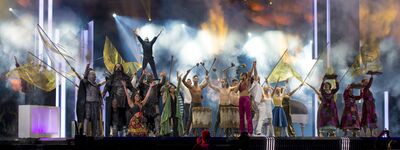Document:The politics of Eurovision
| Does music transcend partisan politics? The politicisation of the Eurovision Song Contest has been going on for many decades. |
Subjects: Eurovision Song Contest, European Broadcasting Union, Politics
Source: The Spectator (Link)
★ Start a Discussion about this document
The Eurovision Song Contest has never been more important, and I don’t just mean for fans of feathers, sequins and some eyebrow-raising exhibitionism.
This year’s Contest, with the grand final taking place in Rotterdam on Saturday evening where James Newman will represent the UK, will be the first competition post-Brexit and promises to test how good, or perhaps not, our relations really are with our European neighbours (and Israel and Australia, but let’s not get technical).
The delightful paradox has always been that politics ‘in lyrics, speeches or gestures’ at Eurovision are all banned by the EBU, rules enforced by the sinister sounding’ Reference Group’. Back in 2009, Georgia fell foul with its group’s lyrics ‘We don’t wanna put in’ – apparently a bit dissident-sounding to the Committee’s ear.
Despite the rules, though, I think we’d all be a bit concerned if Eurovision came around and the Cypriot jury didn’t announce, with a straight face, that 12 points were going to Greece. Politics has been laced into the Contest ever since 1956 when, in the same year six countries signed up for a ‘customs union’, exactly the same six nations participated in the very first trans-European singing contest. The UK didn’t sign up initially, but soon became one of its mightiest competitors, having won five times and come second fifteen times, before picking up our ball and feigning indifference in recent years.
In 1968, a more enthusiastic General Franco decided a Spanish win would bring his country closer to Western Europe, and so they did. Our entry that year, Cliff Richard, will never know if Spain’s victory was by means fair or foul, but Austria boycotted the following year in protest. More happily, when Estonia won in 2001 and joined the EU two years later, their Prime Minister was insistent, ‘We freed ourselves through song.’
When Derry schoolgirl Dana Scallon won in 1970, her surprise win brought delight and unity, albeit temporarily, to her troubled and divided Ireland. Perhaps inspired, Dana later became an MEP.
Never mind Abba’s victory in 1974, Italy’s song didn’t even get to be heard by its homegrown fans. A soaring ballad by Gigliola Cinquetti coincided with a national referendum on divorce, and her song’s single-word title ‘Si’ was deemed to be too subliminally influential to any swing voters.
Even more dramatically that same year, Portugal’s entry E Depois Do Adeus (‘After Goodbye’) became a call to revolution. Two weeks after the Contest, it was played on the country’s radio as the planned signal for a coup d’etat and a brand new government.
As for the UK, our rare victories in recent decades have come alongside wider boosts to the British brand - a Royal Wedding (Bucks Fizz, 1981) and Cool Britannia (Katrina and the Waves, 1997).
The worst we’ve ever scored was 2003's nul points, coinciding with Blair’s invasion of Iraq and the UK’s peak unpopularity with Europeans. However, our entry that year was by poor, atonal pair Jemini, so the embarrassment may have been more than a little deserved.
In more recent years, people power has rallied around the more progressive acts, but only when the song is strong enough to match. In 1998, after Orthodox Jews made threats to the life of an Israeli contestant, transexual Dana International, as she set out to compete in Birmingham, security forces were inside the arena to protect her as she performed and later won.
When Austria’s Conchita Wurst appeared in all her feathered drag finery in 2014, the Russians voiced their strong disapproval. They insisted on a ban, threatened a boycott and intimated that their Eastern bloc neighbours should do the same.
The EBU stood firm, Conchita stayed in and the controversy brought her unexpected support from many voters, outraged on her behalf. At the end of the night, following her surprise victory, she told the crowd, ‘We are unity and we are unstoppable.’
That same year, Russia had sent the Tolmachevy Sisters, who wept when they were booed in the hall, but lots of viewers and voters ultimately realised a pair of teenage twins weren’t responsible for the decisions of their politicians and they ended up coming seventh in the final. Once again it seemed the countrymen and women of Europe were more progressive and tolerant than some national leaders would have us believe.
Perhaps we Brits can take heart from Russia's experience. If political isolation inspires an instinct to confound more established opinions when it comes to the vote, well, James Newman might just be singing his way to fresh UK glory. We can but dream.
